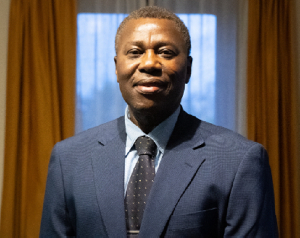The World Health Organization estimates that there are about 37 million people living with HIV worldwide. New HIV infections was projected to be around 2 million in 2014, with 1.2 million people dying of AIDS-related illnesses. In the Africa Region, there were an estimated 1.4 million new HIV infections in 2014. AIDS-related deaths in the region was estimated to be at 790,000 in the same year.
The numbers may still be high, but the world has several reasons to revel. Goal 6 of the Millennium Development Goals - halting and reversing the spread of HIV was achieved and exceeded, the Joint United Nations Programme on HIV/AIDS (UNAIDS) says. Most countries have achieved numerous milestones in their AIDS response programmes, with Cuba even eliminating Mother to Child Transmission of the virus. The global response to HIV has averted 30 million new HIV infections, and nearly 8 million AIDS-related deaths since 2000 when the MDGs were set.
“The epidemic has been forced into decline,” the UNAIDS says. New HIV infections and AIDS-related deaths have fallen dramatically since the peak of the epidemic. New HIV infections have fallen by 35% since 2000. AIDS-related deaths have fallen by 42% since the peak in 2004. As of June 2015, 15.8 million people were accessing treatment. About 11 million people in the Africa Region are currently receiving HIV treatment, as against just 11,000 in 2000. The region has seen a drop of 41% new infections, since 2000.
WHAT NEXT AFTER MDGS?
With the world exceeding the AIDS targets of Millennium Development Goal (MDG) 6, the focus of the universal AIDS response has changed. The global ambition in line with the Sustainable Development Goals (SDGs) is to end the AIDS epidemic by the year 2030.
Ending the AIDS epidemic, according to the UNAIDS Country Director to Ghana, Mr Girmay Haile, means ensuring that AIDS is no longer a threat to public health.
‘’Ending the AIDS epidemic means HIV and AIDS will no longer be an epidemic or public health threat because it will be dealt with as everyday health concern, whereby an infected person will just walk to a hospital and be attended to. It means every HIV positive person by then should be on good treatment and be strong and healthy to contribute to the development of the country,” the Director General of the Ghana AIDS Commission, Dr. Angela El-Adas explains further.
To make these targets a reality, the UNAIDS has introduced a 90-90-90 Fast-Track strategy which is geared towards accelerating progress towards ending the epidemic. This approach requires countries to quicken the pace for essential HIV prevention and treatment approaches.
TARGETS FOR THE 90-90-90 FAST-TRACK STRATEGY
Per the 90-90-90 Fast-Track strategy ,by the year 2020, : 90% of all people living with HIV should know their HIV status, 90% of people who know their HIV-positive status must have access to treatment and 90% of people on treatment should experience suppressed viral loads. The targets also includes reducing new HIV infections by 75% and achieving zero discrimination.
“These targets aim to transform the vision of zero new HIV infections, zero discrimination and zero AIDS-related deaths into concrete milestones and end-points,” says the global agency.
PRINCIPLES OF THE FAST-TRACK APPROACH
The Fast-Track Approach is hinged on principles such as:
Ambition - Building solid political commitment for ambitious HIV prevention, testing, and treatment and human rights targets for 2020 and beyond. Setting national and subnational Fast-Track milestones, informed by global targets
Focus- achieving detailed, localized understanding of country epidemics and focusing services and resources on the locations and populations most affected
Change - Stopping what does not work and scaling up proven programmes. Broadening options for service delivery to reduce the burden on strained health systems and extend the reach of services, including greater use of community-based and rights-based approaches and new partnerships.
Speed - quickening the pace and accelerating the scale-up of effective and efficient services over the next five years
Saturation - Delivering HIV services with the intensity and quality needed to reach the targets within the next five years. Implementing the full range of high-impact HIV services for prioritized locations and populations within the context of equality and non-discrimination.
Human Rights: -Ensuring that services are people-centred and based on recognized human rights standards. Working toward the fulfilment of the highest achievable standard of health, including through accessible, good quality health services. Repealing laws, reforming policies and ending punitive practices for a more effective and equitable AIDS response and advancing a broader rights-based development agenda.
WHY THE NEED TO FAST-TRACK THE AIDS RESPONSE
To the UNAIDS, accelerating the pace for essential HIV prevention and treatment approaches, will limit the epidemic to more manageable levels and enable countries to move towards the elimination phase. It is estimated that by advancing the AIDS response, and by extension reaching the 90-90-90 targets, by 2030, the number of new HIV infections would be 89% lower than in 2010, and the number of AIDS-related deaths would be 81% lower. It also means that 21 million AIDS-related deaths will be averted by then. The Fast-Track strategy will also see 28 million HIV infections averted between 2015 and 2030 in low- and middle income countries.
“Quickening the pace to achieve the Fast-Track Targets would reverse the AIDS epidemic by 2020. With the achievement of these new targets, by 2030 the epidemic would be dwindling. In contrast, with business as usual, the epidemic will have rebounded by 2030, representing an even more serious threat to the world’s future health and well-being and requiring substantial resources for what would then be an uncontrolled epidemic.”
The Michel Sidibe-led UNAIDS however warns that: “If the response is too slow, the AIDS epidemic will continue to grow, with a heavy human and financial toll of increasing demand for antiretroviral therapy and expanding costs for HIV prevention and treatment.”
GHANA AND THE 90-90-90 TARGETS
Achieving the 90-90-90 targets requires countries to move away from the ‘business as usual approach’, and frontload resources, exhibit political commitment and introduce innovativeness in their respective AIDS response policies.
“To reach this visionary goal (Fast-Track Targets) after three decades of the most serious epidemic in living memory, countries will need to use the powerful tools available, hold one another accountable for results and make sure that no one is left behind,’’ says the UNAIDS.
At a recent launch of the new UNAIDS Global Strategy, in Ada, the Country Director of UNAIDS Ghana, Mr Girmay Haile said the target for the year 2020 is needed, as it is urgent call to accelerate progress towards ending the AIDS epidemic.
Ghana, like many other countries have subscribed to the 90-90-90 Fast-Track strategy. The HIV population in Ghana was estimated to be at a total number of 250,232 in 2014. Total new infections in 2014 was estimated to be 11,356, and total AIDS deaths in 2014 was 9,248.
The Director General of the GAC, Dr. Angela El-Adas explains that the Commission is putting every step necessary in place to achieve the goal of 2030. To this end, the Commission, which is under the office of the President of Ghana, is embarking on a one year campaign to achieve the first 90 Fast-Track target - “to have 90% of all persons living with HIV know their HIV status.”
The campaign dubbed ‘the First 90 Campaign’, aims to have majority of persons tested for HIV. It looks at increasing uptake of HIV testing services through vigorous awareness creation and demand generation from March 2016 to February 2017. The Commission envisages that about 6 million people will be tested for HIV, over the one year campaign period.
WHY THE FIRST 90 CAMPAIGN?
The UNAIDS estimates that 17.1 million people living with HIV worldwide do not know they have the virus. This belies the dream of achieving the Second and Third targets of the 90-90-90 targets, as the first step for people living with HIV to be identified and put on treatment, and achieve viral suppression is for them to get tested.
HIV transmission cannot be prevented if individuals do not know their HIV status. An HIV test is the only way to determine if a person is living with the virus. Once an individual knows he is living with HIV, safer behaviours can be adopted to reduce the risk of transmission, or reaching AIDS levels.
According to the Coordinator for the ‘First 90 Campaign’, Mr John Eliasu Mahama, accelerating the AIDS response calls for moving from the re-examining current approaches and broadening testing options.
Taking this into consideration, Madam Golda Asante, a Technical Coordinator at the Ghana AIDS Commission, said at a Stakeholders Consultation on the First 90 target in Accra that the campaign will take HIV testing services beyond health facilities, adding that strategies lined up to meet the first 90 target includes: Engaging the mass media nation-wide to promote the campaign for HIV testing ; using influential celebrities, and prominent traditional and religious leaders to promote testing drive.
The campaign, she said will ensure early detection of HIV, and also help in reducing AIDS-related deaths. Importantly, it will pave way towards achieving the Second 90 of the fast-track targets - ensuring access to treatment for positive diagnosed persons. It will also help in the reduction of new infections including mother to child transmission of HIV.
“Achieving the First 90 target must be prioritized if we are to effectively treat PLHIV and End AIDS Epidemic by 2030, “90% of the population needs to know their status in the shortest possible time, so there is the need to use proactive, aggressive mass HIV testing services campaign mode’’, she stressed.
Going forward, there is the need for everyone to get involved and support the First 90 Campaign, which is the first step to end the AIDS epidemic. Know your HIV status, encourage others to do same. Let us bid AIDS good bye in 2030 !
By : Attah-Effah Badu
The writer is a young media practitioner with great interest in HIV and AIDS related issues. He can be reached on 0248264353 or via :attaheffahbadu@gmail.com
Opinions of Tuesday, 2 February 2016
Columnist: Attah-Effah, Badu














